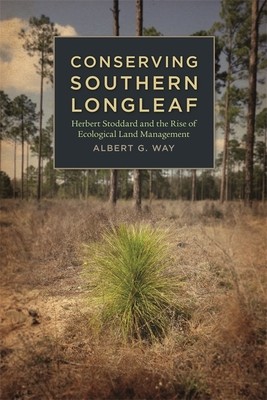
- We will send in 10–14 business days.
- Author: Albert G Way
- Publisher: University of Georgia Press
- ISBN-10: 0820340170
- ISBN-13: 9780820340173
- Format: 15 x 22.6 x 2.3 cm, softcover
- Language: English
- SAVE -10% with code: EXTRA
Reviews
Description
The Red Hills region of south Georgia and north Florida contains one of the most biologically diverse ecosystems in North America, with longleaf pine trees that are up to four hundred years old and an understory of unparalleled plant life. At first glance, the longleaf woodlands at plantations like Greenwood, outside Thomasville, Georgia, seem undisturbed by market economics and human activity, but Albert G. Way contends that this environment was socially produced and that its story adds nuance to the broader narrative of American conservation.
The Red Hills woodlands were thought of primarily as a healthful refuge for northern industrialists in the early twentieth century. When notable wildlife biologist Herbert Stoddard arrived in 1924, he began to recognize the area's ecological value. Stoddard was with the federal government, but he drew on local knowledge to craft his land management practices, to the point where a distinctly southern, agrarian form of ecological conservation emerged. This set of practices was in many respects progressive, particularly in its approach to fire management and species diversity, and much of it remains in effect today. Using Stoddard as a window into this unique conservation landscape, Conserving Southern Longleaf positions the Red Hills as a valuable center for research into and understanding of wildlife biology, fire ecology, and the environmental appreciation of a region once dubbed simply the "pine barrens."EXTRA 10 % discount with code: EXTRA
The promotion ends in 14d.02:27:42
The discount code is valid when purchasing from 10 €. Discounts do not stack.
- Author: Albert G Way
- Publisher: University of Georgia Press
- ISBN-10: 0820340170
- ISBN-13: 9780820340173
- Format: 15 x 22.6 x 2.3 cm, softcover
- Language: English English
The Red Hills region of south Georgia and north Florida contains one of the most biologically diverse ecosystems in North America, with longleaf pine trees that are up to four hundred years old and an understory of unparalleled plant life. At first glance, the longleaf woodlands at plantations like Greenwood, outside Thomasville, Georgia, seem undisturbed by market economics and human activity, but Albert G. Way contends that this environment was socially produced and that its story adds nuance to the broader narrative of American conservation.
The Red Hills woodlands were thought of primarily as a healthful refuge for northern industrialists in the early twentieth century. When notable wildlife biologist Herbert Stoddard arrived in 1924, he began to recognize the area's ecological value. Stoddard was with the federal government, but he drew on local knowledge to craft his land management practices, to the point where a distinctly southern, agrarian form of ecological conservation emerged. This set of practices was in many respects progressive, particularly in its approach to fire management and species diversity, and much of it remains in effect today. Using Stoddard as a window into this unique conservation landscape, Conserving Southern Longleaf positions the Red Hills as a valuable center for research into and understanding of wildlife biology, fire ecology, and the environmental appreciation of a region once dubbed simply the "pine barrens."

Reviews